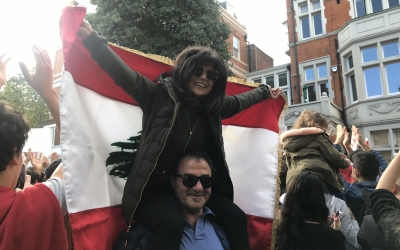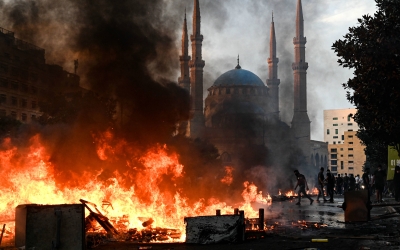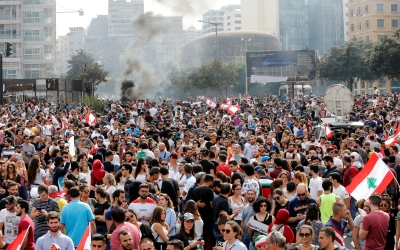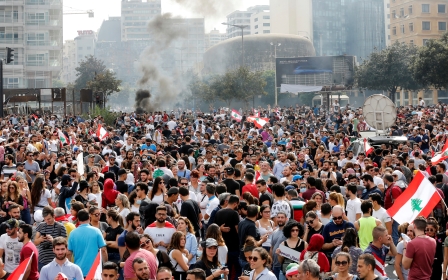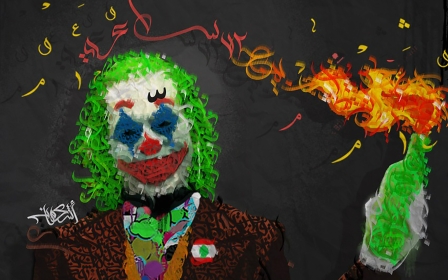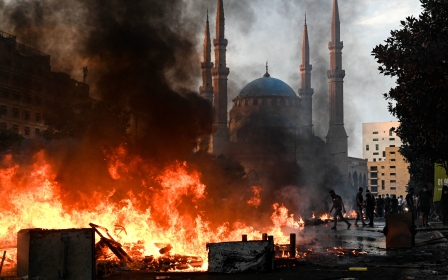Lebanon protesters keep pressure on government as reform deadline nears
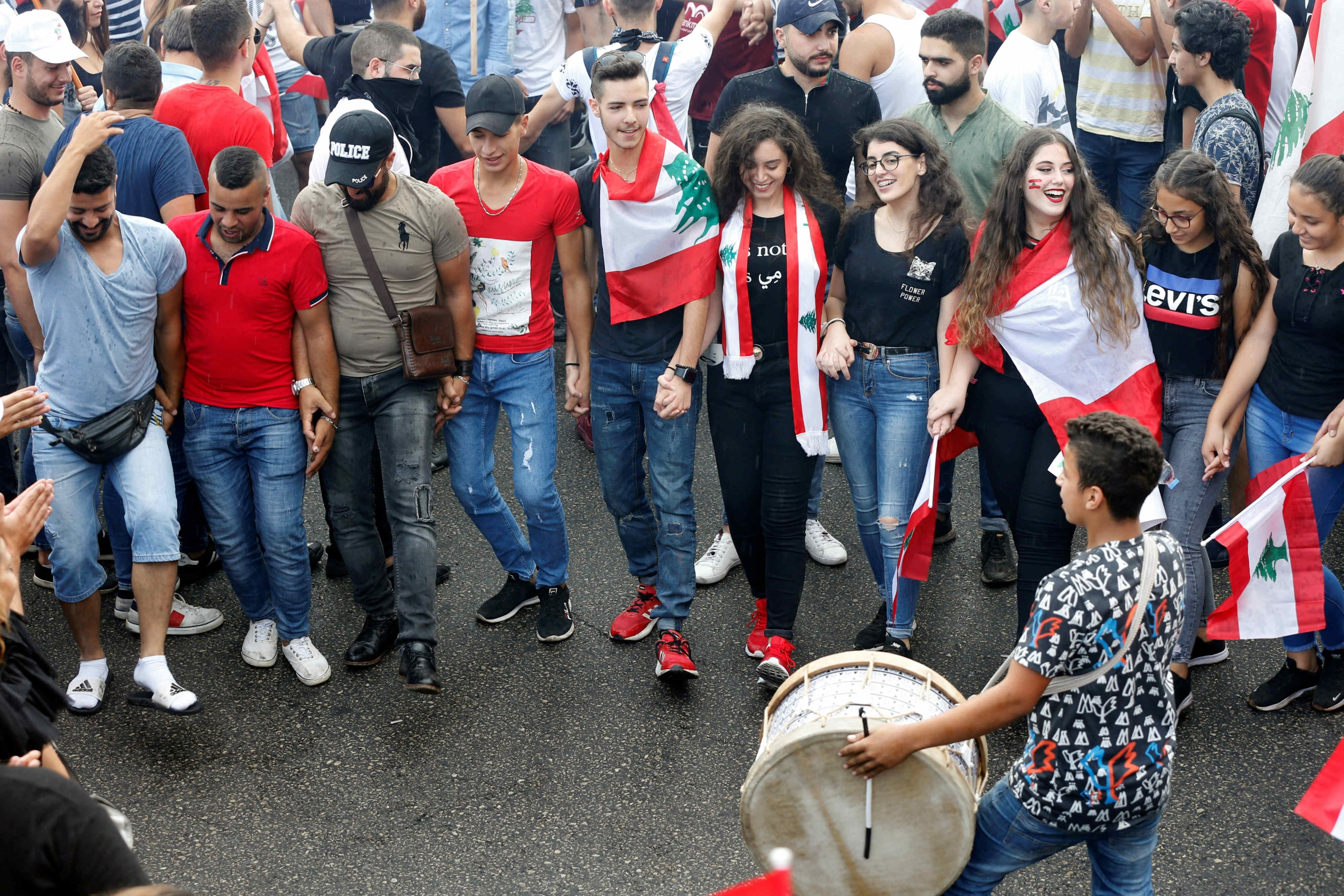
Protesters in Lebanon flooded the streets on Sunday, keeping pressure on Prime Minister Saad al-Hariri as a self-imposed deadline to deliver a package of badly needed reforms for the country's crumbling economy drew near.
Anti-government protests that have swept the country since Thursday have pulled together all segments of Lebanese society in an unusually unified call for the downfall of a political elite that protesters blame for plunging the economy into crisis.
Demonstrators clogged streets across the country for a fourth day with marches resembling outdoor festivals. Loudspeakers blared nationalistic music as energised protesters chanted calls for the government's fall
"I didn't expect people from the country's north, south and Beirut to join hands and like each other," said Sahar Younis, a 32-year-old worker with a non-governmental organisation.
"The protests have brought together everyone and this has never happened before."
Three-day deadline
Hariri gave his feuding coalition partners a 72-hour deadline on Friday to agree to reforms that could ward off economic crisis, hinting he may otherwise resign.
He accused his rivals of obstructing budget measures that could unlock $11bn in western donor pledges and help avert economic collapse.
If Hariri, a Sunni Muslim who is traditionally backed by the West and Sunni Gulf Arab allies, resigns it would be harder for the various parties that make up the ruling coalition to form a new cabinet.
A new cabinet would also likely see the Iranian-backed Hezbollah and its allies more in control, a shift that would make it nearly impossible for international donors or Gulf Arab countries at odds with Iran to offer aid or investments.
Government sources said Hariri was waiting for his coalition to get on board with the economic proposals, which include taxes on banks and a plan to overhaul the country's costly and crumbling state electricity utility.
'Excessive and unnecessary force'
Late on Saturday, the Maronite Christian Lebanese Forces party announced it would withdraw its four ministers from the government, piling further pressure on Hariri as he seeks to pass a budget that his government has pledged would include no new taxes.
The Association of Banks in Lebanon announced that all banks would be closed on Monday because of the unrest.
Ending rampant corruption is a central demand of the protestors, who say the country's leaders have used their positions to enrich themselves for decades through favourable deals and kickbacks.
"All of the leaders should be put under house arrest and be held accountable to return the money they stole from the state so Lebanon can get back on its feet," said Antoine Zahli, 43, a pharmacist who was among the protesters in central Beirut, told the Reuters news agency.
"We want to stay in Lebanon to build our future, but if these corrupt politicians stay here what future will be left for us?" said 17-year-old student Cherbel Anton.
Protests on Saturday had a carnival atmosphere, with young families taking part, in sharp contrast to demonstrations on Thursday and Friday.
Human Rights Watch said on Saturday that Lebanon's security forces had used excessive and unnecessary force against protesters in central Beirut during Friday's protests.
The Internal Security Force's riot police fired tear gas at thousands of largely peaceful protesters, including children, the US-based rights group said.
The army cleared the protest areas, sometimes using excessive force, as riot police fired tear gas and rubber bullets at fleeing protesters, it added in a statement.
Hezbollah support
Hezbollah leader Sayyed Hassan Nasrallah has thrown his powerful group's weight behind the current government, saying the country's deep economic crisis means precious time should not be wasted forming a new one.
Nasrallah said on Saturday that imposing more taxes on people could lead to an "explosion" of unrest.
"If we don't work towards a solution, we're heading towards a collapse of the country. It will be bankrupt, and our currency will not have any value," he said.
"The second danger is a popular explosion as a result of wrong handling of the situation."
The budget could help one of the world's most indebted countries unlock billions of dollars that were pledged by international donors last year but are conditional on long-delayed reforms to curb waste and corruption.
Without a foreign funding boost, Lebanon faces bleak economic prospects.
Officials and economists also predict a currency devaluation or a debt default within months if it fails to sure up its finances.
The International Monetary Fund (IMF) said last week that Lebanon's crisis requires tough austerity measures such as tax hikes and levies on fuel, steps the country's politicians have publicly vowed not to take.
The mounting unrest was triggered in part by a proposed fee on WhatsApp calls, a measure quickly scrapped but that was seen by many as the latest government attempt to squeeze citizens receiving little in return from the state.
Lebanon's economy registered just 0.3 percent growth last year.
The IMF said the reforms were needed to stem a ballooning deficit and public debt it forecasts to reach 155 percent of GDP by year-end, one of the world's highest.
Middle East Eye propose une couverture et une analyse indépendantes et incomparables du Moyen-Orient, de l’Afrique du Nord et d’autres régions du monde. Pour en savoir plus sur la reprise de ce contenu et les frais qui s’appliquent, veuillez remplir ce formulaire [en anglais]. Pour en savoir plus sur MEE, cliquez ici [en anglais].


